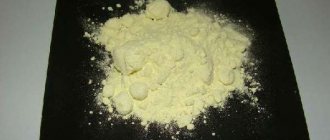Sulfur is an element that, when mentioned, makes you think of the occult, weapons and toxic chemicals. The history of this element is very rich, and the scope of its modern application is very extensive.
Previously, priests and shamans used sulfur vapors to perform ceremonies and rituals. Later, sulfur began to be added to flammable and explosive substances, that is, it was used for military purposes. Arsenic and other dangerous toxic compounds were also made from sulfur. Then one of the strongest inorganic acids, sulfuric acid, was made from it...
Using sulfur for militaristic, religious and other purposes, people began to subconsciously consider sulfur a very dangerous element from which they should stay away. But since the end of the 19th century, information began to appear that sulfur could be useful. The healing effect of sulfur springs, the discovery of sulfur in proteins and the identification of its valuable biological properties made it possible to understand that in small doses it is very important for us.
Signs of excess sulfur
Under natural conditions, when a person receives a mineral only through food, its excess cannot occur. But if the body is exposed to toxic sulfur compounds, this can cause an “overdose” and poisoning.
Symptoms of obvious excess sulfur are presented in the form of headache, severe weakness, convulsions, loss of consciousness, mental disorders, breathing problems, digestive disorders, etc.
Long-term consumption of foods containing sulfites may result in a less noticeable excess than exposure to industrial or household sulfur-containing substances. However, the health problems that arise from a “sulfite overdose” are also very unpleasant.
Sulfites are preservatives added to carbonated drinks, alcohol, vinegar and food coloring. With their excessive consumption, increased fatigue, nausea, inflammation of the skin and mucous membranes, general poor health, etc. are possible. In order to reduce their negative impact, it is worth abandoning the corresponding products and consuming natural sources of sulfur.
Preparations containing sulfur
Sulfur is available in two main forms: dimethyl sulfoxide (DMSO) and methylsulfonylmethane (MSM).
Dimethyl sulfoxide (DMSO) and medications that contain it should only be taken under medical supervision, since internal administration of DMSO has side effects such as constipation or diarrhea, nausea and vomiting, drowsiness, dizziness, and headache. External use of preparations (creams, ointments) containing dimethyl sulfoxide (DMSO) may cause skin irritation. Contraindicated in pregnant and breastfeeding women. DMSO is contraindicated in diabetes, asthma, heart disease, kidney disease, and liver disease.
Methylsulfonylmethane (MSM) is a safe drug, but if you want to take it in large dosages, it is better to consult your doctor.
Oversupply
Sulfur is very useful for the human body, but in nature there are also mineral compounds that are highly toxic - these are hydrogen sulfide, carbon disulfide and various sulfur oxides. They are produced in hazardous industries, fires or chemical warehouses when environmental conditions are violated.
Some researchers believe that the use of sulfur-containing preservatives contributes to the development of bronchial asthma.
Reasons for excess sulfur: large intake of sulfur and its oxides into the human body; metabolic disorder.
To avoid high levels of sulfur in the human body, it is recommended to consume raw, fatty poultry meat and fresh eggs in your diet.
What is sulfur and its role in the human body
Sulfur for the human body is a necessary element that is part of many cells. The mass of the mineral is 0.24% of a person’s weight.
Biological role of sulfur:
- With its help, disulfide bridges are formed in the body, with the help of which protein activity occurs.
- Participates in energy transfer between cells.
- Performs a transport function in the body.
- Sulfur is responsible for the coagulation of leukocytes, moves methyl groups and promotes fat metabolism.
- The mineral is part of insulin, coenzymes, and histamine.
- Sulfur in the body has a rejuvenating effect.
What if it's not enough?
Sulfur deficiency is extremely rare and only occurs in those who receive virtually no protein foods
. Strict vegetarians should be especially careful when planning their diet. They need to regularly consume plant foods containing essential amino acids. Symptoms of sulfur deficiency are mainly skin and hair problems. A lack of the substance can also cause muscle pain, disturbances in the nervous system, circulatory problems, inflammatory reactions and decreased immunity.
Advantages and disadvantages
If you carefully study the reviews of consumers who managed to test the effects of the drugs on their sites, then in these comments you can find both positive and negative responses. After all, the product has a number of disadvantages.
Pros and cons of colloidal suspension
Advantages Disadvantages has an effective, long-lasting effect; the drug has acaricidal properties; mixing of the working mass with other substances is allowed; sulfur vapors do not harm plants; can be used as a soil fertilizer; inexpensive product available in convenient dosage forms
is a toxic chemical, which requires the use of protective equipment and precautions; restriction of use near bee farms; crops cannot be processed at high air temperatures; not suitable for spraying balcony and indoor plants
The described disadvantages relate more to the inconvenience of using the drug than to its effectiveness in combating diseases and pests. Therefore, you can count on the maximum benefits of colloidal sulfur when growing garden crops.
Methylsulfonylmethane MSM
One of these dietary supplements is MSM NSP . MSM (methylsulfonylmethane) is a water-soluble organic product containing sulfur. It has neither odor nor taste and is considered one of the least toxic biological substances. Regular table salt is much more toxic than MSM. The organic sulfur in MSM NSP is very well absorbed. When taken orally, part of the dose of MSM is delivered to the cells of the mucous membrane, while the rest of the substance is quickly absorbed into the blood. Within 24 hours, the sulfur released from MSM is completely absorbed by the body’s tissues, its excess is easily removed with urine and bile.
Indications for use
Sulfur is used in folk practice and medicine, for example, in the field of dermatology: with the help of sulfur, doctors “fight” the symptoms of scabies, eczema and folliculitis. The mineral is used for seborrhea, psoriasis or hair loss. Doctors also prescribe it when diagnosing various skin acne, sycosis and herpes zoster.
In the presence of high pigmentation of the epidermis or the presence of freckles, sulfur can be used as an exfoliant, and in case of constipation - as a laxative. Very often, sulfur helps with chronic hemorrhoids. It is also prescribed as an anthelmintic.
When diagnosing polyarthritis or sciatica, the mineral is used as an irritant, and in the presence of progressive paralysis, body temperature is increased using a sulfur suspension. Sulfur is also used for severe poisoning with mercury, metals and hydrocyanic acid. At home, sulfur is used for inflammatory processes of the gums.
Micronutrient-rich foods
To ensure a sufficient supply of sulfur to the human body, one must have a balanced diet, which will include both sufficient amounts of protein and products of animal and plant origin. Also don’t forget vitamin B and amino acids. If you wish, you can consult a nutritionist to create a proper diet.
| Product | Sulfur content per 100 g | Percentage of daily requirement |
| Milk (powdered, low-fat) | 339 mg | 35% |
| Milk (powdered, 35%) | 261 mg | 27% |
| Soybean (grain) | 245 mg | 25% |
| Cottage cheese | 222 mg | 23 % |
| Chickpeas | 200 mg | 21 % |
| Chicken egg (white) | 188 mg | 20 % |
| Cottage cheese 9% | 182 mg | 19% |
| Almond | 200 mg | 19% |
| Chicken egg | 178 mg | 19 % |
| Peas | 172 mg | 18 % |
| Chicken egg (yolk) | 172 mg | 18 % |
| Lentils | 163 mg | 16 % |
| Beans | 160 mg | 17 % |
| Quail egg | 125 mg | 13 % |
| Walnut | 102 mg | 11 % |
| Cabbage | 200 mg | 19 % |
| Poppy | 640 mg | 63 % |
| Beef liver | 239 mg | 22 % |
| Mung beans | 238.6 mg | 24 % |
| Hot smoked fish | 233 mg | 24 % |
| Rabbit meat | 225 mg | 23 % |
| Salmon | 225 mg | 23 % |
| Brynza | 221 mg | 21 % |
Permissible doses
Information about the required daily intake of this macronutrient is quite contradictory.
The lack of accurate information is explained by the lack of a reasonable amount of data on the effect of the element on the body.
Experts agreed that for a person with no abnormalities in the body’s activity, 3-4 g of sulfur per day is enough.
With an optimal diet, rich in a variety of fruits and vegetables, meat and dairy products, additional consumption of sulfur is not required.
Some part of society should monitor the presence of this macronutrient in their diet, these are:
- Children;
- Persons with diseases of the musculoskeletal system;
- People actively involved in sports;
- Workers with heavy physical activity;
Interaction with other substances
The “opponents” of sulfur are Selenium, Barium, and also heavy metals – molybdenum and lead, Mo.
For better absorption of sulfur, the following products will help:
- fish;
- honey;
- bran;
- pumpkin;
- oatmeal;
- peas;
- poultry and rabbit meat;
- Rye bread;
- buckwheat.
Where is it used?
Pharmacy sulfur is used to treat various diseases; medicines based on this trace element can quickly eliminate the manifestations of articular and dermatological pathologies.
What does sulfur help with:
- allergies and dermatological diseases;
- bronchial asthma;
- arthritis, scoliosis, bursitis, osteoarthritis, myositis, sprains;
- convulsions;
- as an anti-inflammatory and analgesic;
- to strengthen the immune system, speedy recovery after long-term illnesses;
- to reduce the body's need for insulin in diabetes mellitus.
Read also: What foods contain carbohydrates?
In cosmetology, products with sulfur are used to prevent early aging, improve the appearance of the skin, give strength and shine to hair, and strengthen nail plates.
Sulfur is used in cosmetology
For external medicinal preparations, precipitated (purified, combustible) sulfur is used; it is part of sulfur ointment, which is prescribed for the treatment of scabies, seborrhea, and psoriasis. In combination with lanolin, petroleum jelly, and stearic acid, the microelement has an anthelmintic, exfoliating and anti-inflammatory effect - such drugs are prescribed to eliminate rosacea and scalp lesions.
Purified sulfur in the form of tablets is used in the treatment of enterobiasis, constipation, and as an external remedy for the treatment of dermatological pathologies. In the form of a yellow powder, the product is used in folk and traditional medicine; it can be used internally and in the preparation of medicines.
Homeopathic sulfur has a weak therapeutic effect; it is produced in the form of granules; the drug must be taken for a long time under the supervision of a specialist.
Sulfur is useful not only for people, but also for animals - the feed product is included in vitamins for animals. This microelement is also used to enrich fertilizers in agriculture, in the production of steel and rubber, explosives, and pyrotechnics.
Who is it suitable for?
Due to its healing properties, cosmetics with sulfur are suitable for caring for:
- Problematic;
- Acne;
- Seborrheic;
- Bold
skin.
Recommended for those who suffer from:
- Atopic dermatitis;
- Seborrhea;
- Psoriasis.
Cutaneous seborrhea and acne can be dangerous to health. Pimples, blackheads, and purulent acne are a breeding ground for the development of bacteria.
Cosmetics with sulfur not only cleanse the skin, but also:
- Normalizes sebum secretion;
- Smooth out;
- Calm;
- Relieves inflammation;
- Cleanses and tightens pores;
- Lightly moisturize.
In addition, they improve skin tone.
The ability to regulate sebum production is beneficial for those struggling with dandruff. Dandruff can also be accompanied by itching or seborrhea of the scalp.
Special cosmetics with sulfur:
- Exfoliates;
- Regulates the functioning of the sebaceous glands;
- Stabilizes skin condition;
- Helps strengthen hair follicles;
- Reduces hair loss.








